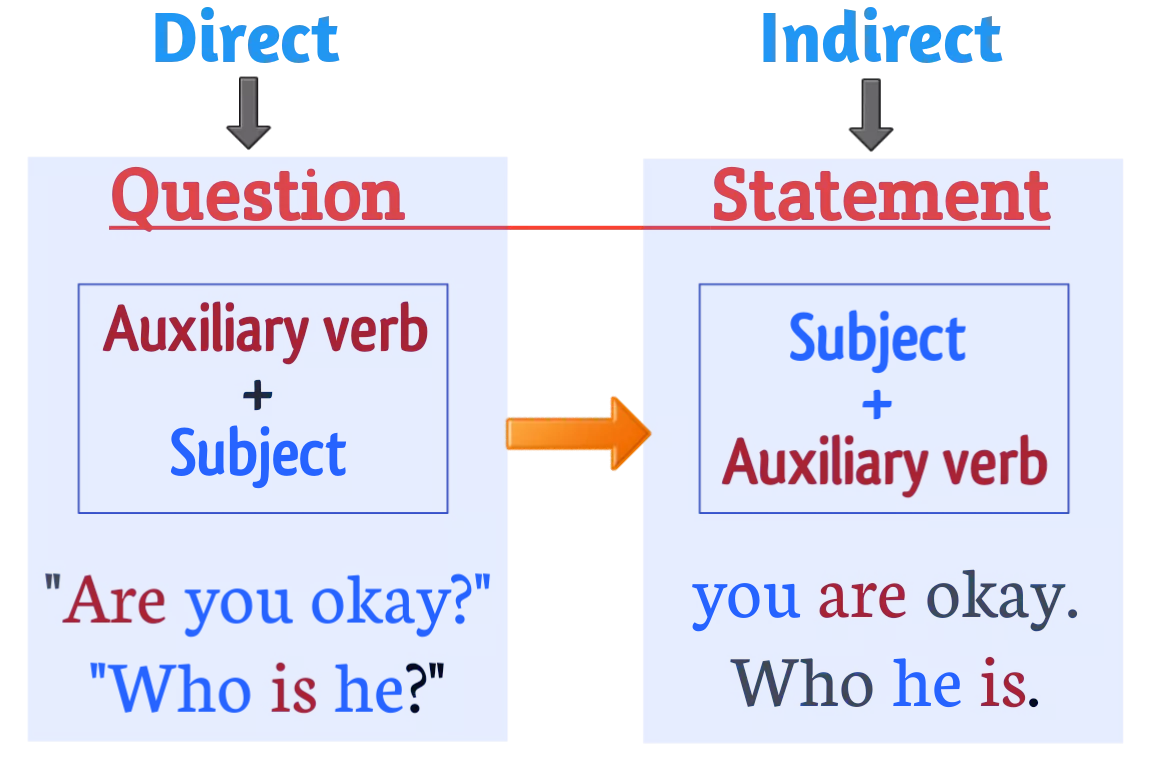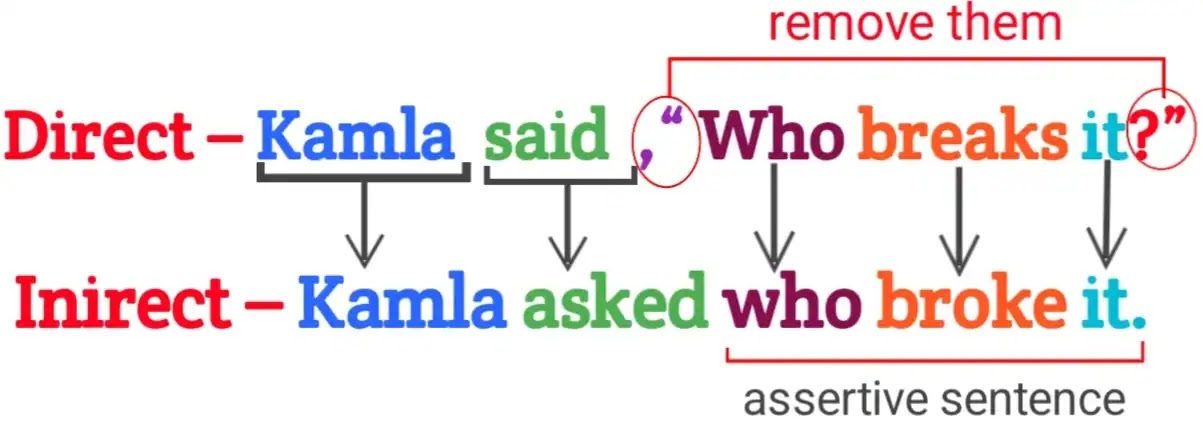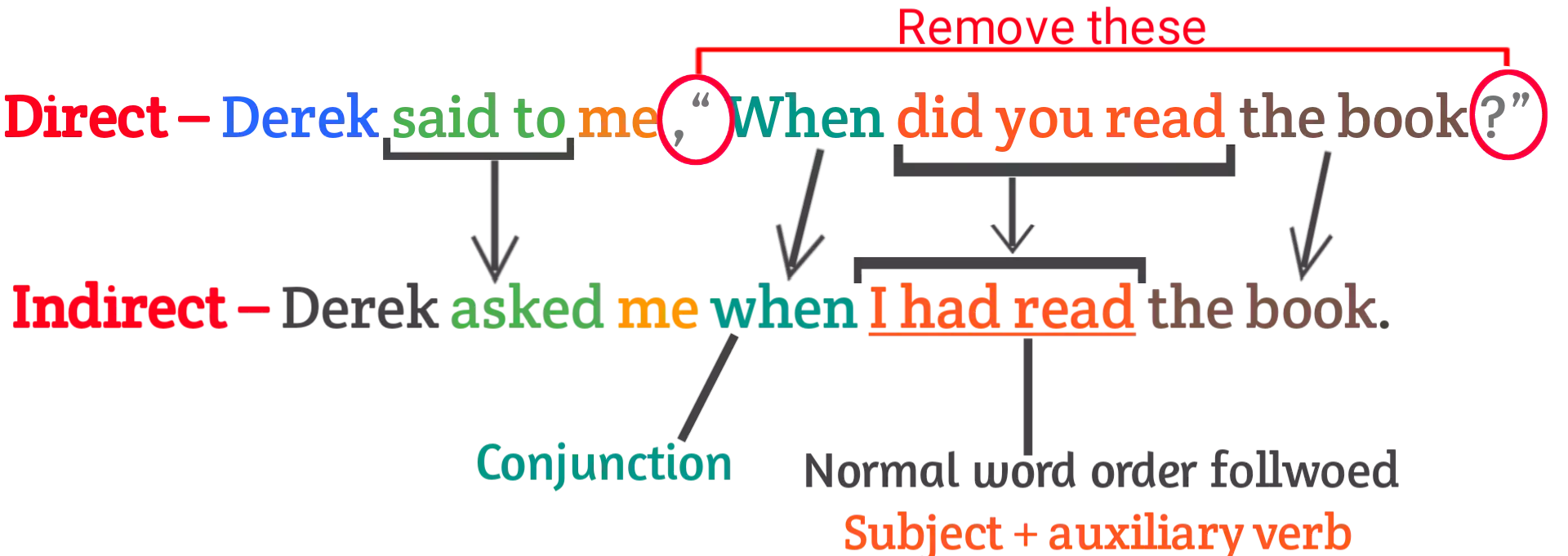Table of Contents:
Examples:
1. WH Word used as the Subject.
2. WH Word used as the Object.
4. WH Word used as the Adverb.
5. WH Questions with Auxiliary Verbs.
Rules:
*** Rules for Direct and Indirect Speech of WH Questions.
Direct and Indirect Speech WH Questions Examples :
Type 1:
WH Word Used as the Subject –
| Direct | Indirect |
|---|---|
| John said to me, “Who likes me?” | John asked me who liked him. |
| Kamal said, “Who is talking to her?” | Kamal asked / wondered who was talking to her. |
| “what has made you weak?”, She said to her brother. | She asked her brother what had made him weak. |
| John said to me, “Who threatened Mark last night?” | John asked me who had threatened Mark the previous night. |
| The teacher asked, “Who was making noise?” | The teacher asked who had been making noise. |
| Seth asked me, “What had frightened you?” | Seth asked me what had frightened me. |
| Dean said to Seth and Roman, “Who will bell the cat?” | Dean asked Seth and Roman who would bell the cat. |
| I asked them, “Who will be playing as a forward?” | I asked them who would be playing as a forward. |
| John said to me, “Who didn’t laugh at you?” | John asked me who hadn’t laughed at me. |
| “Who did not help him yesterday?”, said John to me. | John asked me who had not helped him the day before. |
| John said to me, “What doesn’t irritate you?” | John asked me what didn’t irritate me. |
| John said to me, “Who hasn’t called him a coward?” | John asked me who hadn’t called him a coward. |
| John said to me, “Who doesn’t know you?” | John asked me who didn’t know me. |
| John said to us, “Who will not be going with me?” | John asked us who would not be going with him. |
| John said to me, “What doesn’t make her feel proud?” | John asked me what didn’t make her feel proud. |
Related : See Indirect speech for Vocative words.
Type 2:
WH Word Used as the Object –
| Direct | Indirect |
|---|---|
| They asked my brother, “What do you do?” | They asked my brother what he did. |
| She asked me, “What are you doing.” | She asked me what I was doing. |
| Mary said to her sister, “When is father arriving?” | Marry asked her sister when their father was arriving. |
| Daniel said to her, “What have you bought for the children?” | Daniel asked her what she had bought for the children. |
| Dean said to her, “What did I say?” | Dean asked her what he had said. |
| His wife said to Rob, “Why were you running?” | His wife asked Rob why he had been running. |
| “Why had you sent her to the shop before cleaning the floor?”, said Rob. | Rob asked why I had sent her to the shop before cleaning the floor. |
| I said to him, “When will you clean the floor?” | I asked him when he would clean the floor. |
| The old lady asked me, “Whom will you be selling flowers if I shall die?” | The old lady asked me whom I would sell flowers if she should die. |
| Dean said to his daughter, “What hasn’t you bought?” | Dean asked his daughter what hadn’t she bought. |
| Joseph said to me, “Whom don’t you respect?” | Joseph asked me whom I didn’t respect. |
| His wife asked Joseph, “whom didn’t you invite?” | His wife asked Joseph whom he hadn’t invited. |
| Kate said to her friends, “Why don’t you talk to me?” | Kate asked her friends why they didn’t talk to her. |
| “Why don’t you laugh?”, said Kate to me. | Kate asked me why I didn’t laugh. |
| She also said, “Whom aren’t they going to allow?” | She also asked whom they weren’t going to allow. |
Type 3:
Wh word used as an adverb –
| Direct | Indirect |
|---|---|
| John asked her, “When do you water the plants?” | John asked her when she watered the plants? |
| Joe said to me, “Why do you think football is boring?” | Joe asked me why I thought football was boring. |
| Riyanka asked her teacher, “Why is the earth moving around the sun?” | Riyanka asked her teacher why the earth is moving around the sun. |
| Teacher said to Ratul, “How have you done so many mistakes?” | Teacher asked Ratul how he had done so many mistakes. |
| Joe said to his sister, “Where did you keep the keys?” | Joe asked his sister where she had kept the keys. |
| Ben said to me, “How did you do this?” | Ben asked me how I had done that. |
| Nitin asked his sister, “Why was Rahul placating you?” | Nitin asked his sister why Rahul had been placating her. |
| “Why had Dave left the place before I arrived?” said peter to his friend. | Peter asked his friend why Dave had left before he had arrived. |
| Reena said to her father, “Where did you see my mother for the first time?” | Reena asked her father where he had seen her mother for the first time? |
| Joe said to me, “Why will you go to Darjeeling?” | Joe asked me Why I would go to Darjeeling. |
| I said, “When will you be reading this book?” | I asked when he would be reading that book. |
| Joe said to me, “Why don’t you like football?” | Joe asked me why I didn’t like football. |
| “When will these vacancies be filled?”, said the reporter to the minister. | The reporter asked the minister when those vacancies would be filled. |
Join our Telegram Channel for PDFs
Type 4:
Wh word + noun –
| Direct | Indirect |
|---|---|
| She asked me, “Which book do you want to read?” | She asked me which book I wanted to read. |
| The reporter asked me, “Which candidate are you going to vote for?” | The reporter asked which candidate I was going to vote for. |
| Her uncle said to her, “Which cycle is yours?” | Her uncle asked her which cycle was hers. |
| My father said to me, “Which novel have you read?” | My father asked me which novel I had read. |
| “Which shirt did you buy for me?” said Henry to his mother. | Henry asked his mother which shirt she had bought for him. |
| “Which village do you live in?” asked the old man. | The old man asked which village I lived in. |
| “Which chocolate don’t you like?” said the shopkeeper. | The shopkeeper asked which chocolate I didn’t like. |
Type 5:
WH Questions with Auxiliary Verbs :
(A) WH Question with Be Verbs:
Reported Clause – “auxiliary verb + Subject”.
| Direct | Indirect |
|---|---|
| Peter said to me, “What am I supposed to do here?” | Peter asked me what he was supposed to do there. |
| She asked me, “Who is that lady?” | She asked me who that lady was. |
| I said to my sister, “Which is not your notebook?” | I asked my sister which her notebook was not. |
| I asked her “How are you?” | I asked her how she was. |
| The old man asked the child, “What is your name?” | The old man asked the child what his name was. |
| I asked mother “How was your day?” | I asked mother how her day had been. |
| “Who was not present yesterday?” asked the teacher. | The teacher asked who had not been present the day before. |
| The teacher asked her “Why were you absent yesterday?” | The teacher asked her why she had been absent the previous day. |
| I said to my friend “Why weren’t you sitting there?” | I asked my friend Why she had not been sitting there. |
| “What will be the consequences in your opinion?” the activist asked. | The activist asked what the consequences would be in my opinion. |
| Rachael asked me, “Why shall I be there for nothing.” | Rachael asked me why she should be there for nothing. |
| Michael said, “Why shall I not be there if I get valuable advice?” | Michael asked why she should not be there if she got valuable advice. |
(B) WH Questions with Modal Auxiliary Verbs:
| Direct | Indirect |
|---|---|
| I said, “How can you be so irresponsible?” | I wondered how she could be so irresponsible. |
| She said to us, “Who cannot remember math formula?” | She asked us who couldn’t remember math formula. |
| I asked her, “How could you insult me?” | I asked her how she could insult me. |
| “Why couldn’t you score even a single run?” they said to me. | They asked me why I couldn’t score even a single run. |
| “When will you switch off the TV?” Said Mr. Paul to his son. | Mr. Paul asked his son when he would switch off the TV. |
| Jaya said to her son, “Why won’t you visit your grandparents?” | Jaya asked her son why he wouldn’t visit his grandparents. |
| “Well” he said, “What would you like to take?” | He asked what I would like to take. |
| The police said, “Why wouldn’t you answer my questions?” | The police asked why he wouldn’t answer his questions. |
| “Why shall I help him?” Said Roger. | Roger asked why he should help him. |
| “Why shall not we encourage her?” I asked. | I asked why we shouldn’t encourage her. |
| “What should I ask for?” she said. | She asked what she should ask for. |
| Mrs. Jones asked Mr. Jones, “Why shouldn’t she come to our house?” | Mrs. Jones asked Mr. Jones why she shouldn’t go to their house. |
| I said, “Who may be there?” | I asked who might be there. |
| “Why may not I come in?” She asked me. | She asked me why she might not go in. |
| She said, “What might he ask for?” | She asked what he might ask for. |
| “What might not she say?” I asked. | I asked what she might not say. |
| “Who must be driving the car?” Mrs Jones said. | Mrs. Jones asked who must be driving the car. |
| Anne said to her husband, “Who used to stare at me?” | Anne asked her husband who used to stare at her. |
| “Why used you not to help your mother?” I asked my friend. | I asked my friend why he used not to help his mother. |
| I said, “What ought I to sacrifice?” | I asked what I ought to sacrifice. |
| The young man said, “Why ought you to take tuitions?” | The young man asked why I ought to take tuitions. |
| I said to my friend, “Why need you say this?” | I asked my friend why he need say that. |
| She asked, “Who need not pass the exam?” | She asked who need not pass the exam. |
| She said, “How dare you say this?” | She exclaimed how he dare say that. |
| I asked her, “Whom you dare not oppose?” | I asked her whom she dare not oppose. |
Rules for Direct and Indirect Speech of WH Questions
Type 1: WH + verb + object + ?
Type 2: WH + helping verb + subject + verb + ?
Type 4: WH + noun + helping verb + subject + main verb + ?
Start with 3 general rules:
| Questions | Statements |
|---|---|
| How do you know that? | How you know that. |
| Why does he smoke? | Why he smokes. |
| Where did she go? | Where she went. |
However, let’s come to our main discussion
Change the Narration of Wh Questions – step by step process :–
Direct – Subject + say, “Wh word (Only Who/What) + verb + object + ?”
Step 1:
Indirect – Kamla asked…
Step 2:
Step 3:
Structure 1 of wh question follows a normal word order i.e. subject + verb + object where the wh word itself acts as the subject. In this case only ‘Who’ or ‘what’ or ‘which’ can be used.
Other examples –Direct – Ben said to me, “Who calls you a liar?”
Indirect – Ben asked me who called me a liar.
Indirect – I asked who had done it.
Direct – She said, “What helped him at that moment?”
Indirect – She asked what had helped him at that moment.
Indirect – She asked me what motivated me.
Reported Speech Based on Type 2 Question:
Direct – Joe said to me, “What do you want?”
So here is the final indirect structure.
Indirect – Subject + ask/asks/asked + Wh + Subject + verb + object.
Structure 2 of wh question follows a structure i.e. auxiliary verb + subject + main verb+ ? where the wh word acts as the object. In this case only ‘Whom’, ‘what’ etc. can be used.In the indirect speech, the word order must be normal i.e. Subject + auxiliary verb + main verb + object.
Well,
Indirect –
Reported Speech Based on Type 3 Question:
Direct – Subject + reporting verb (+ to + object) + , + “WH + helping verb + subject + main verb + object + ?”
E.g. –
Indirect – Derek asked me when I had read the book.
Indirect – You ask your sister where she kept the bunch of keys.Direct – I said to my father, “How did you do it?”
Indirect – I asked my father how he had done it.
Direct – She said to me, “Whom did you give your earphones?”
Indirect – She asked me whom I had given my earphones.
Move on to the Final type –>
Reported Speech Based on Type 4 Question:
Step1:
Step 4:
Indirect – You asked me which book I wanted to read.
Direct – Maroof said to his mother, “Which shirt did you buy for me?”
Indirect – Maroof asked his mother which shirt she had bought for him.Direct – Rakib said to Akil, “Which village do you live in?”
Indirect – Rakib asked Akil which village he lived in.
Direct – Kamal says to Bimal, “Which chocolate don’t you like?
Indirect – Kamal askes Bimal which chocolate he doesn’t like.
Direct and Indirect Speech of WH Question with Be-Verb:
Type 1:
Direct – Rohit said, “Who is the man?”
Step 4:
Indirect – …asked Wh + object + be verb.Other examples:
Direct – Grandmother said to me, “How are you?”
Indirect – Grandmother asked me how I was.Direct – They say to him, “What is your name.”
Indirect – They ask him what his name is.
Type 2:
Direct – Kafil said, “How was your day?”
Indirect – Kafil asked how my day had been.Direct – The teacher said to my sister, “Why were you absent yesterday?”
Indirect – The teacher asked my sister why she had been absent the previous day.
For negative sentence use a ‘not’ between had and been.
Direct – He said to his sister, “Why weren’t you present there?”
Indirect – He asked his sister why she had not been present there.
Thank you…




![Change the narration of WH questions Direct and Indirect Speech of WH Questions (with Examples) [PDF] | How to Change the Narration of WH Questions](https://blogger.googleusercontent.com/img/b/R29vZ2xl/AVvXsEgGH-v_rM0o4RK6NdW2iYoBt56G7jNemzTNEC68CfdWAlftRaenETAdfvwTc1SgRX5S8ItEYrrxJDUb6Gac640wJTlpfYeXkW8owZ2REr2zqblr2UrXDyLRIvloYkJyZkljlVXgm13Zw18/s16000/Indirect speech wh questions.webp)

